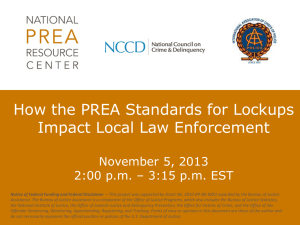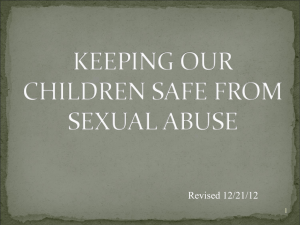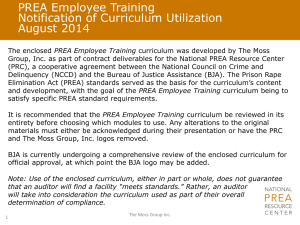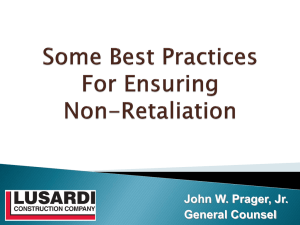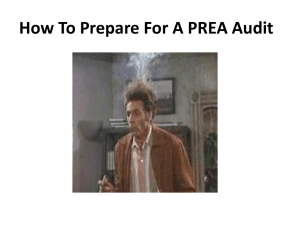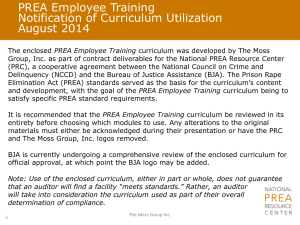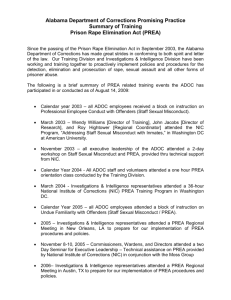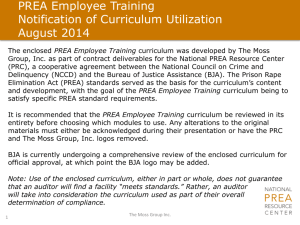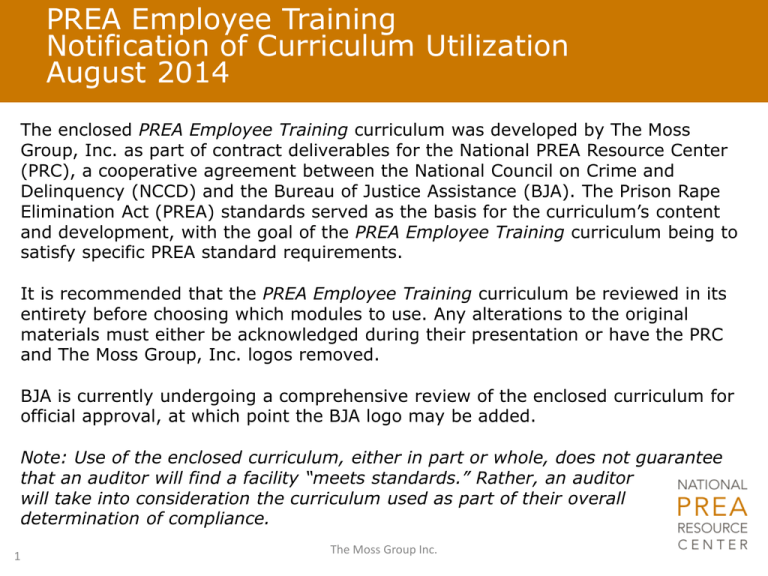
PREA Employee Training
Notification of Curriculum Utilization
August 2014
The enclosed PREA Employee Training curriculum was developed by The Moss
Group, Inc. as part of contract deliverables for the National PREA Resource Center
(PRC), a cooperative agreement between the National Council on Crime and
Delinquency (NCCD) and the Bureau of Justice Assistance (BJA). The Prison Rape
Elimination Act (PREA) standards served as the basis for the curriculum’s content
and development, with the goal of the PREA Employee Training curriculum being to
satisfy specific PREA standard requirements.
It is recommended that the PREA Employee Training curriculum be reviewed in its
entirety before choosing which modules to use. Any alterations to the original
materials must either be acknowledged during their presentation or have the PRC
and The Moss Group, Inc. logos removed.
BJA is currently undergoing a comprehensive review of the enclosed curriculum for
official approval, at which point the BJA logo may be added.
Note: Use of the enclosed curriculum, either in part or whole, does not guarantee
that an auditor will find a facility “meets standards.” Rather, an auditor
will take into consideration the curriculum used as part of their overall
determination of compliance.
1
The Moss Group Inc.
Unit 2: Inmates’ Rights to be Free from
Sexual Abuse and Sexual Harassment
and
Staff and Inmates’ Rights to be Free
from Retaliation for Reporting
Notice of Federal Funding and Federal Disclaimer – This project was supported by Grant No. 2010-RP-BX-K001 awarded by the Bureau of Justice Assistance. The Bureau
of Justice Assistance is a component of the Office of Justice Programs, which also includes the Bureau of Justice Statistics, the National Institute of Justice, the Office of
Juvenile Justice and Delinquency Prevention, the Office for Victims of Crime, and the Office of Sex Offender Sentencing, Monitoring, Apprehending, Registering, and
Tracking. Points of view or opinions in this document are those of the author and do not necessarily represent the official position or policies of the U.S. Department of
Justice nor those of the National Council on Crime and Delinquency (NCCD), which administers the National PREA Resource Center through a cooperative agreement with
the Bureau of Justice Assistance.
Introductions
Faculty
•
•
•
3
Participants
Name, Title
Work Location
Experience with PREA and/or
training
•
Name, Position
The Moss Group Inc.
Employee Training Series Outline
This training is part of series of trainings to assist agencies with
PREA Standards 115.31, 115.131, 115.231, and 115.331
4
Unit 1:
The Prison Rape Elimination Act: Overview of
the Law and Your Role
Unit 2:
Inmates’ Rights to be Free from Sexual Abuse
and Sexual Harassment and Staff and Inmate
Rights to be Free from Retaliation for Reporting
Unit 3 Part I:
Prevention and Detection
Unit 3 Part II:
Response and Reporting
Unit 4:
Professional Boundaries
Unit 5:
Effective and Professional Communication with
Inmates
The Moss Group, Inc.
Unit 2 Objectives
1. Understand agency policy and PREA requirements related to
inmates’ right to be free from sexual abuse and sexual
harassment
2. Understand agency policy and PREA requirements related to
staff and inmates’ right to be free from retaliation for reporting
3. Discuss the role of retaliation in contributing to a code of
silence
5
The Moss Group Inc.
Objective 1: Understand agency policy and PREA
requirements related to inmates’ right to be free from sexual
abuse and sexual harassment
To meet this objective we will discuss:
• Key terms and definitions
• Inmates’ rights under PREA
• Facility/agency policy related to inmates’ rights to be
free from sexual abuse
6
The Moss Group Inc.
Key Terms
•
•
•
•
•
7
Sexual Abuse
Sexual Harassment
Reporting
Retaliation
Code of Silence
The Moss Group Inc.
Sexual Abuse – Inability to Consent
• By law inmates cannot consent while in a confinement setting,
to staff, volunteers, or contractors
• Any sexual activity between staff and inmates is considered a
violation of PREA and zero-tolerance policy
• This is a violation because of the imbalance of power that exists
in confinement settings
United State Department of Justice, PREA Final Rule, 2012; http://ojp.gov/programs/pdfs/prea_final_rule.pdf
8
The Moss Group Inc.
Inmate-on-Inmate Sexual Abuse
Occurs when there is:
• Contact between the penis and the vulva or the
penis and the anus, including penetration,
however slight
• Contact between the mouth and the penis, vulva,
or anus
• Penetration of the anal or genital opening of
another person, however slight, by a hand, finger,
object or other instrument
• Any other intentional touching, either directly or
through the clothing, of the genitalia, anus, groin,
breast, inner thigh, or the buttocks of another
person, excluding contact incidental to a physical
altercation
United State Department of Justice, PREA Final Rule, 2012; http://ojp.gov/programs/pdfs/prea_final_rule.pdf
9
The Moss Group Inc.
Staff Member/Contractor/Volunteer on Inmate
Sexual Abuse
Occurs when there is actual, attempted,
threatened or requested:
• Contact between the penis and the vulva or the
penis and the anus, including penetration,
however slight
• Contact between the mouth and the penis, vulva
or anus
• Contact between the mouth and any body part
where the staff member, contractor, or volunteer
has the intent to abuse, arouse, or gratify sexual
desire
United State Department of Justice, PREA Final Rule, 2012; http://ojp.gov/programs/pdfs/prea_final_rule.pdf
10
The Moss Group Inc.
Staff Member/Contractor/Volunteer on Inmate
Sexual Abuse, Continued
Occurs when there is actual, attempted,
threatened or requested:
• Penetration of the anal or genital opening, however
slight, by a hand, finger, object, or other instrument,
that is unrelated to official duties or where the staff
member, contractor, or volunteer has the intent to
abuse, arouse, or gratify sexual desire
• Any other intentional contact, either directly through
the clothing, of or with the genitalia, anus, groin,
breast, inner thigh, or the buttocks, that is unrelated
to official duties or where the staff member,
contractor or volunteer has the intent to abuse,
arouse, or gratify sexual desire
United State Department of Justice, PREA Final Rule, 2012; http://ojp.gov/programs/pdfs/prea_final_rule.pdf
11
The Moss Group Inc.
Sexual Harassment
Includes:
• Repeated and unwelcome sexual advances, requests
for sexual favors, or verbal comments, gestures, or
actions of a derogatory or offensive sexual nature by
one inmate directed toward another
• Repeated verbal comments or gestures of a sexual
nature to an inmate, detainee, or resident by a staff
member, contractor, or volunteer, including demeaning
references to gender, sexually suggestive or
derogatory comments about body or clothing, or
obscene language or gestures
United State Department of Justice, PREA Final Rule, 2012; http://ojp.gov/programs/pdfs/prea_final_rule.pdf
12
The Moss Group Inc.
Inmate Rights
Rights Established by PREA Standards
• Inmates have the right to be free from sexual
abuse and sexual harassment [115.11 (a); 115.33
(b)]
• Inmates and staff have the right to be free from
retaliation for reporting [115.67 (a)]
United State Department of Justice, PREA Final Rule, 2012; http://ojp.gov/programs/pdfs/prea_final_rule.pdf
13
The Moss Group Inc.
Sexual Abuse in Confinement
Can be perpetrated by a/an:
•
•
•
•
•
14
Inmate
Staff Member/Employee
Contractor
Volunteer
Others?
The Moss Group Inc.
PREA or Rule Violation?
•
•
•
•
•
15
Willing (consensual) sexual
relationships among inmates
is not a PREA violation but
rather a RULE violation
Whether a relationship is
consensual or non-consensual
can sometimes be difficult to
determine
What may appear willing
behavior may in fact involve
sexual pressuring
Refer to your facility’s policy
for guidance
Regardless, all allegations or
suspicions of sexual abuse
should be reported
The Moss Group Inc.
Consequences of NOT Respecting Rights
There are significant consequences if staff do not respect the
rights of inmates to be free from sexual abuse/harassment, as
well as staff and inmates’ rights to be free from retaliation for
reporting
– Generally unsafe environment
16
–
Physical/psychological damage to inmates/staff
–
Distrust of authority
–
Re-traumatization
The Moss Group Inc.
Consequences of NOT Respecting Rights,
Continued
Consequences (continued):
• Physical health
• Increased vulnerability to
future abuse
• Constitutional violations
(8th and 14th
Amendments)
• Violations of state law
• Violations of agency policy
• Diminished credibility of
the corrections profession
17
The Moss Group Inc.
Policy Review
• What does policy state regarding inmates’ rights to be free from
sexual abuse and sexual harassment?
• How does staff fulfill this requirement?
− Prevention
− Detection
− Response
− Reporting
18
The Moss Group Inc.
Objective 2: Understand agency policy and PREA requirements
related to staff and inmates’ right to be free from retaliation
for reporting
To meet this objective we will discuss:
• Different types of retaliation
• Inmate and staff rights under PREA from retaliation
for reporting
• Applicable policy
19
The Moss Group Inc.
Retaliation
Retaliation occurs when an
inmate or staff injures, harms, or
intimidates a person who has
reported sexual abuse and/or
sexual harassment — or
attempts to do so — in response
to the report
United State Department of Justice, PREA Final Rule, 2012; http://ojp.gov/programs/pdfs/prea_final_rule.pdf
20
The Moss Group Inc.
Retaliation, Continued
Overt Retaliation
•
•
•
Slashing car tires
Verbal or emotional abuse
Physical assault
Indirect Retaliation
•
•
•
•
21
Veiled threats
Shunning from a group
Sudden change in demeanor
without explanation
Invisible retaliation
The Moss Group Inc.
Agency Protection Against Retaliation
(115.67)
• The facility/agency shall protect inmates and staff who report
sexual abuse/harassment or cooperate with an investigation
from retaliation
• A staff member should be designated to monitor retaliation
• Protection measures should be used to include:
− Housing or transfers for inmate victims or abusers
− Removal of alleged staff or inmate abuser from contact
with victims
− Emotional support services for inmate or staff who fear
retaliation
United State Department of Justice, PREA Final Rule, 2012; http://ojp.gov/programs/pdfs/prea_final_rule.pdf
22
The Moss Group Inc.
Agency Protection Against Retaliation
(115.67), Continued
• For at least 90 days following a report, the agency should
monitor the conduct/treatment of staff
• Items to monitor include:
• Disciplinary reports (inmates)
• Housing or program changes (inmates)
• Negative performance reviews (staff)
• Reassignments of staff
• For inmates, monitoring should include status checks
• Obligation to monitor shall terminate if the agency determines
the allegation unfounded
United State Department of Justice, PREA Final Rule, 2012; http://ojp.gov/programs/pdfs/prea_final_rule.pdf
23
The Moss Group Inc.
What Does Policy Say?
• Does policy designate a staff person to monitor retaliation?
• Based on your policy, what rights as staff do you have to be free
from retaliation?
• Who might you go to if you feel that you are being retaliated
against?
• Who can the inmates go to if they feel they are being retaliated
against?
24
The Moss Group Inc.
Objective 3: Discuss the role of retaliation in
contributing to a code of silence
To meet this objective we will discuss:
• The definition of code of silence
• Implications of retaliation on reporting culture
• Strategies for staff to support a reporting culture
25
The Moss Group Inc.
Impact of Retaliation on Reporting
•
Contributes to the code of
silence by creating barriers to
reporting through threats and
intimidation
•
When people perceive their
safety to be at risk, they are
less likely to report
26
The Moss Group Inc.
Code of Silence
An informal institutional or
organizational culture that says
members of the group will not
inform on or give evidence or
testimony against other
members of the group, even
though actions of the other
members may involve breaches
of policy or even the criminal
law. Also referred to as the
“Code of Blue.”
27
The Moss Group Inc.
Code of Silence, Continued
Is it part of your agency’s culture?
In one study, 46% of police officers witnessed
misconduct, but did not report it. Why?
•
•
•
•
•
I would be ostracized
Officer who committed misconduct would be fired
I would be fired
I would be “blackballed”
Administration wouldn’t do anything
Neil Trautman, National Institute of Ethics, Study of Code of Silence, 2001
28
The Moss Group Inc.
Indicators of a Reporting Culture
• Staff and inmates are willing to report suspected sexual
abuse/harassment
• Staff and inmates have a high degree of trust in the
investigative process and in administrative follow-up
• Communication and interactions are generally respectful and
professional, both between staff and from staff to inmates
29
The Moss Group Inc.
Indicators of a Reporting Culture, Continued
• Staff and inmates know how to report and know the steps in the
investigative process
• Staff and inmates are confident there will be no retaliation for
reporting
• Data from grievances, incident reports, and disciplinaries is
collected and reviewed by administrators and supervisors, and
trends in reporting are identified
30
The Moss Group Inc.
Group Discussion: What Does This Mean for
My Agency?
• What happens to those who report misconduct in my agency?
• What happens to those who do not report and should?
• What characteristics at my facility support reporting?
• What characteristics at my facility my be a barrier to reporting?
31
The Moss Group Inc.
Review: Unit 2 Objectives
1. Understand agency policy and PREA requirements related to
inmates’ right to be free from sexual abuse and sexual
harassment
2. Understand agency policy and PREA requirements related to
staff and inmates’ right to be free from retaliation for reporting
3. Discuss the role of retaliation in contributing to a code of
silence
32
The Moss Group Inc.
End of Unit 2
33
The Moss Group Inc.

